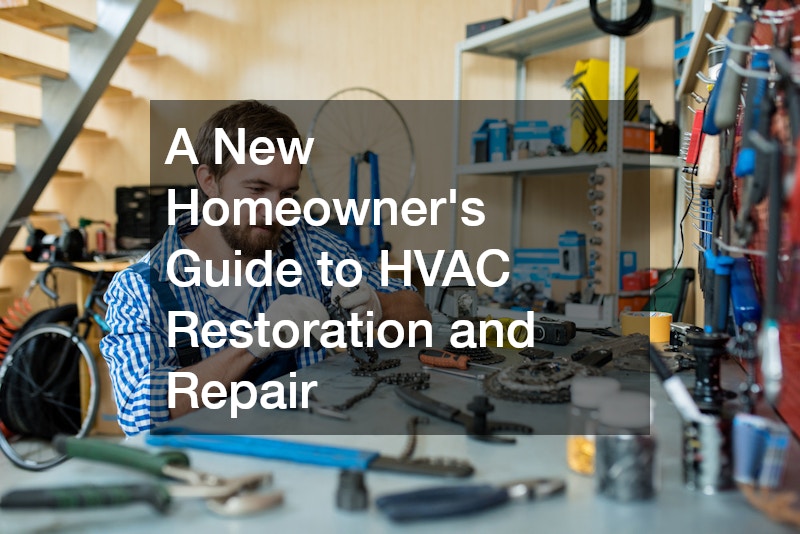
Welcome to the ultimate guide to HVAC restoration and repair. In this article, we will explore the basics of HVAC systems, signs of damage, the importance of maintenance, DIY repairs, professional restoration services, costs associated with restoration, and much more.
Overview of HVAC Restoration and Repair
Section 1: HVAC System Basics
Understanding the fundamentals of an HVAC system is crucial for proper maintenance and repair. An HVAC system, or Heating, Ventilation, and Air Conditioning system, is responsible for regulating the temperature, humidity, and air quality of a building.
Typically, an HVAC system consists of a furnace or heat pump, an air conditioner, ductwork, vents, and a thermostat. The system works by drawing in air from the building, heating or cooling it, and then distributing it back through the ductwork.
Knowing how your HVAC system functions can help you identify issues early on and prevent costly repairs down the line. Regular maintenance is key to ensuring that your HVAC system operates efficiently and effectively.

Section 2: Signs of HVAC Damage
Being able to recognize signs of HVAC damage is essential for maintaining a comfortable indoor environment. Common indicators of HVAC issues include inconsistent temperatures throughout the building, unusual noises coming from the system, and increased energy bills.
If you notice these signs, it’s important to promptly address the problem to prevent further damage to your HVAC system. Ignoring issues can lead to more extensive repairs or even the need for a full system replacement.
Contacting a local air conditioning repair expert or HVAC contractor can help diagnose the problem and recommend the necessary repairs or restoration services to get your system back up and running properly.
Section 3: Importance of HVAC Maintenance
Regular maintenance is critical for the longevity and efficiency of your HVAC system. Including HVAC care in your New House Build Checklist ensures that by scheduling routine inspections and tune-ups, you can catch minor issues before they escalate into major problems that require costly repairs. Prioritizing this in your checklist helps maintain comfort and efficiency in your new home for years to come.
In addition to preventing breakdowns, proper maintenance can also improve the energy efficiency of your HVAC system, leading to lower utility bills and reduced environmental impact. HVAC maintenance should be performed at least once a year by a qualified HVAC technician.
Investing in HVAC maintenance is a proactive way to protect your home comfort and increase the lifespan of your system. HVAC contractors offer comprehensive maintenance and heating repair services to keep your system running smoothly year-round.
Section 4: DIY HVAC Repairs
While some HV AC repair jobs require professional expertise, there are several DIY tasks that homeowners can safely perform to maintain their systems. Changing air filters, cleaning vents, and inspecting ductwork are simple maintenance tasks that can improve the efficiency of your HVAC system.
However, more complex repairs, such as fixing refrigerant leaks or repairing electrical components, should be left to experienced HVAC technicians. Attempting these repairs without the necessary knowledge and tools can result in further damage to your system.
If you’re unsure about a DIY repair or notice significant issues with your HVAC system, it’s best to contact a local air conditioner repair company for professional air conditioner service.

Section 5: HVAC Repair and Restoration Services
HVAC restoration involves repairing or replacing components of an HVAC system to bring it back to optimal working condition. This process may include cleaning ducts, replacing filters, repairing leaks, or upgrading outdated equipment.
It’s important to consider HVAC repair services if you notice significant issues with your system, such as frequent breakdowns, inefficient performance, or poor indoor air quality. Professional HVAC technicians can assess the condition of your system and recommend the necessary repairs or replacements.
When hiring an HVAC contractor for restoration services, be sure to choose a reputable and experienced company that specializes in heater and AC repair and maintenance. Research local HVAC services and read customer reviews to find a reliable contractor for your restoration needs.
Section 6: Cost of HVAC Restoration
The cost of HVAC restoration can vary depending on the extent of the damage, the age of the system, and the type of repairs or replacements needed. On average, homeowners can expect to pay anywhere from a few hundred to several thousand dollars for HVAC restoration services.
Factors that can affect the cost of restoration include the cost of replacement parts, labor fees, and the complexity of the repair job. It’s important to request multiple quotes from HVAC contractors and compare the services offered before making a decision.
While the cost of HVAC services may seem daunting, investing in the health and efficiency of your HVAC system can save you money in the long run by avoiding expensive emergency repairs or premature system replacements.
Section 7: HVAC Repair vs. Replacement
When deciding between repairing or replacing your HVAC system, it’s important to consider the age, condition, and efficiency of the existing system. In some cases, simple repairs can extend the lifespan of an older system and improve its performance.
However, if your HVAC system is outdated, inefficient, or in constant need of repairs, it may be more cost-effective in the long run to invest in a new system. Modern HVAC systems are designed to be more energy-efficient and environmentally friendly, leading to lower energy bills and reduced carbon emissions.
A qualified HVAC contractor can assess the condition of your system and provide recommendations on whether to repair or replace. Keep in mind that regular maintenance and timely repairs can help prolong the lifespan of your HVAC system.
Section 8: Finding a Reliable HVAC Contractor
Choosing the right HVAC contractor is crucial for ensuring quality repairs and maintenance for your system. When searching for a local air conditioner repair company, look for contractors who are licensed, insured, and experienced in HVAC services.
Ask for recommendations from friends and family, read online reviews, and check the contractor’s credentials before hiring them. A reputable HVAC contractor should provide transparent pricing, detailed service agreements, and excellent customer service.
By selecting a trustworthy HVAC contractor for your repair and maintenance needs, you can have peace of mind knowing that your system is in good hands. Establishing a long-term relationship with an HVAC professional can benefit you in the long run by ensuring prompt and reliable service.
Section 9: Energy Efficiency and HVAC Systems
Improving the energy efficiency of your HVAC system is not only good for the environment but can also save you money on utility bills. Simple measures such as sealing ducts, insulating your home, and upgrading to a programmable thermostat can enhance the performance of your system.
If your HVAC system is outdated or inefficient, consider investing in energy-efficient HVAC options, such as heat pumps or smart thermostats. These technologies are designed to optimize energy usage and reduce your carbon footprint while providing optimal comfort.
Regular maintenance, timely repairs, and energy-efficient upgrades are essential for maximizing the efficiency of your HVAC system. By taking steps to improve energy efficiency, you can enjoy a comfortable home environment while reducing your environmental impact.

Section 10: Common HVAC Problems
Homeowners often encounter common HVAC issues that can disrupt the comfort of their living spaces. Some of the most frequent problems include clogged air filters, refrigerant leaks, faulty thermostats, and uneven heating or cooling throughout the building.
Preventing common HVAC problems involves regular maintenance, prompt repairs, and proactive measures to keep your system running smoothly. Scheduling annual inspections, changing filters regularly, and monitoring the performance of your system can help identify issues early on.
Contacting an HVAC professional at the first sign of trouble can prevent minor issues from turning into major repairs. By staying vigilant and proactive about HVAC maintenance, you can avoid unexpected breakdowns and ensure consistent comfort in your home.
Section 11: HVAC Restoration Process
The HVAC restoration process involves a thorough assessment of the system’s condition, identification of underlying issues, and implementation of repairs or replacements as needed. Professional HVAC technicians will inspect all components of the system, including ductwork, filters, and electrical connections.
Once the issues are identified, the restoration process may include cleaning ducts, replacing worn-out parts, recharging refrigerant, or recalibrating the thermostat. The goal of restoration is to restore the efficiency and functionality of the HVAC system and improve indoor air quality.
The duration of the HVAC restoration process can vary depending on the complexity of the repairs and the availability of replacement parts. It’s important to work with a reliable HVAC contractor who can complete the restoration in a timely and efficient manner.
Section 12: Extending the Lifespan of Your HVAC System
Prolonging the lifespan of your HVAC system requires regular maintenance, timely repairs, and diligent care of the equipment. By scheduling annual inspections, changing air filters, and monitoring the performance of your system, you can detect issues early and prevent major breakdowns.
Additionally, optimizing the energy efficiency of your HVAC system can reduce wear and tear on the equipment and extend its lifespan. Investing in upgrades, such as smart thermostats or zoning systems, can improve the performance of your system while reducing energy consumption.
Consulting with an HVAC professional for maintenance tips and recommendations can help you protect your investment and ensure the longevity of your system. By following a proactive maintenance schedule, you can enjoy a comfortable indoor environment for years to come.
Section 13: Importance of Air Duct Cleaning
Air duct cleaning is a critical aspect of HVAC maintenance that is often overlooked by homeowners. Over time, dust, dirt, and debris can accumulate in the ductwork, reducing airflow, and contaminating indoor air quality.
Having your air ducts professionally cleaned on a regular basis can improve the efficiency of your HVAC system, reduce allergens in the air, and enhance the overall comfort of your home. HVAC experts recommend scheduling air duct cleaning every 3 to 5 years, or more frequently if you have pets or allergies.
By investing in air duct cleaning as part of your HVAC maintenance routine, you can ensure that your system operates at peak performance and delivers clean, healthy air throughout your home. Contacting a reputable HVAC contractor for duct cleaning services can help you breathe easier and enjoy a cleaner living environment.

Section 14: Seasonal HVAC Maintenance
Seasonal HVAC maintenance is essential for keeping your system in top condition year-round and preventing unexpected breakdowns. Each season brings unique challenges for your HVAC system, from heavy usage in the summer to potential freezing pipes in the winter.
Performing regular maintenance tasks, such as changing filters, cleaning vents, and inspecting outdoor units, can help you avoid costly repairs and ensure consistent comfort in your home. By following a seasonal maintenance schedule, you can catch minor issues before they escalate into major problems.
Many HVAC contractors offer seasonal maintenance plans that include tune-ups, inspections, and priority service in case of emergencies. By enrolling in a maintenance program, you can enjoy peace of mind knowing that your HVAC system is well cared for throughout the year.
Section 15: Future of HVAC Technology
The future of HVAC technology is marked by innovations that prioritize energy efficiency, sustainability, and user-friendly controls. Advancements in smart thermostats, variable refrigerant flow systems, and geothermal heating are poised to revolutionize the way we heat and cool our homes.
Smart HVAC systems, equipped with sensors and automation features, can learn user preferences, adjust temperatures based on occupancy, and optimize energy consumption. These technologies aim to provide greater comfort and convenience while reducing energy waste and lowering utility costs.
As HVAC technology continues to evolve, homeowners can expect more eco-friendly and cost-effective solutions for heating and cooling their living spaces. By staying informed about the latest trends in HVAC innovation, you can make informed decisions about upgrading your system and improving your home comfort.
In conclusion, HVAC restoration and repair are essential aspects of maintaining a comfortable and healthy indoor environment. By understanding the basics of HVAC systems, recognizing signs of damage, prioritizing maintenance, and investing in professional services, homeowners can prolong the lifespan of their systems and optimize energy efficiency.
Whether you’re in need of a simple repair, a full system restoration, or advice on upgrading to energy-efficient technologies, it’s important to work with a trusted HVAC contractor who can provide expert guidance and reliable service. By following the tips outlined in this comprehensive guide, you can ensure that your HVAC system operates at peak performance year-round.
Remember that regular maintenance, timely repairs, and energy-efficient upgrades are key to protecting your investment and ensuring a comfortable home environment for you and your family. Stay proactive about HVAC care, and you’ll enjoy the benefits of a well-functioning system for years to come.


